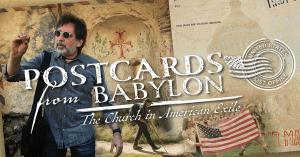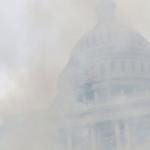
Postcards from Babylon, the documentary centered around Brian Zahnd’s book of the same name releases this Thursday. I got the chance to review the documentary and loved it, espcially in light of the seige on the Capitol. It’s release is very timely. Instead of writing a review, I offere you a review from my friend, Rick, with links to the film and his original review. Enjoy!
by Rick Pidcock
The new Postcards From Babylon documentary comes out on January 21. And I had the opportunity to screen it for a review. But I wanted to share some additional reflections from a section later in the documentary where a number of soldiers begin to process their wounds of regret regarding their participation in the War on Terror.
As the tensions build and the grief begins to flow, the soldiers walk onto a stage in front of a large protest to name their regret and to throw their medals of war into the wind.
One solider says, “May they be able to forgive us for what we’ve done to them. May we begin to heal. And may we live in peace from here.”
Another says, “Sometimes we make mistakes. And the way we change that is we admit our mistakes, and take responsibility for our mistakes. And we change. And we become better. And we do it together.”
And then a third soldier says, “Terror perpetuates terror. And at some point, we need to mature as a nation and stop this cycle.”
As I reflect on their words, I also hear them not simply as words regretting the American fascination with war, but also within the context of regret from an emerging group of people who are realizing the harm our white conservative evangelicalism has caused to marginalized communities.
We need to admit what we’ve done and come to terms with the reality that theological terror fuels ethical terror. The reason our white Christian communities have abused, raped, enslaved, and murdered our Black brothers and sisters is not because we’ve had an otherwise healthy theology that we simply deviated from. We have been theologically formed through the celebration of an atonement theology focused on punishing wrongdoers with unspeakable violence to have an ethos of labeling people we fear as wrongdoers that need to be punished with unspeakable violence.
The result of these theological and ethical cycles of terror has been centuries of violence, mass incarceration and death.
One of the most gut wrenching quotes of the documentary is when Lisa Sharon Harper says, “What would it look like for the church to now look inward and ask the deeper question, the deepest question, of how this faith has shaped the world according to a lie, how this faith has shaped the course of generations of people of color. I don’t think that the church has integrity to speak any good news at all until the church actually understands the reality that it is living and has crafted bad news in public policy. It has established theological foundations for oppression that have lived throughout the times and only changed shape over the generations, but has not been repented of.”
As Martin Luther King Jr. Day approaches, many white Christians will do Google searches for quotes from King about unity to post on their social media wall. And as a result, they’ll feel like they aren’t racist. But when it comes down to the humility of being willing to push down the theological walls that were formed in our white male dominated communities and simply listen to Womanist and Black liberation theologians, the vast majority of us will be unwilling to. Instead, we may listen to the one or two Black people who don’t threaten our theological or political walls. And then we’ll feel better about ourselves and move on with our lives.
Harper says, “So repentance looks like seeing the image of God in them and recognizing their call and their capacity to exercise dominion in this moment, at this time, and to say, ‘What will it take for things to be made well for you?’ And let them speak it, and let their word be an exercise of dominion in this space.”
For the walls of Babylon to fall and for all things to be made new, we cannot simply begin with reconciliation and a call to be unified. White and Black communities are not equal contributors here who simply need to listen to one another. White communities are the oppressors who need to repent and repair. Black communities are the oppressed who need to heal and be heard. White communities need to begin to see the image of God in Black bodies, wonders, and ideas. We need to be quiet and listen to them. Womanist and Black liberation theologians are the ones who should be exercising dominion in this space.
So let’s head the words of Harper and let them speak dominion over us in this space, to tell us what they need so that things can be made well for them again.
That’s the Way of Jesus that Postcards From Babylon begins to explore. And wherever you find yourself within or exiled from the Church today, I think this way is a good news worth exploring.













